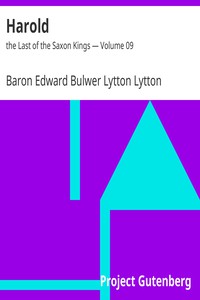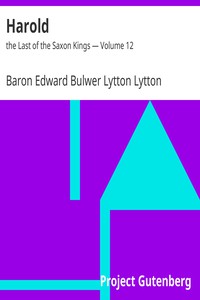Harold : the Last of the Saxon Kings — Complete, Lytton [best e reader for academics .txt] 📗

- Author: Lytton
Book online «Harold : the Last of the Saxon Kings — Complete, Lytton [best e reader for academics .txt] 📗». Author Lytton
235 (return)
Saxon Chronicle.
236 (return)
Saxon Chronicle.—“When it was the nativity of St. Mary, then were the men’s provisions gone, and no man could any longer keep them there.”
237 (return)
It is curious to notice how England was represented as a country almost heathen; its conquest was regarded quite as a pious, benevolent act of charity—a sort of mission for converting the savages. And all this while England was under the most slavish ecclesiastical domination, and the priesthood possessed a third of its land! But the heart of England never forgave that league of the Pope with the Conqueror; and the seeds of the Reformed Religion were trampled deep into the Saxon soil by the feet of the invading Norman.
238 (return)
WILLIAM OF POITIERS.—The naive sagacity of this bandit argument, and the Norman’s contempt for Harold’s deficiency in “strength of mind,” are exquisite illustrations of character.
239 (return)
Snorro Sturleson.
240 (return)
Does any Scandinavian scholar know why the trough was so associated with the images of Scandinavian witchcraft? A witch was known, when seen behind, by a kind of trough-like shape; there must be some symbol, of very ancient mythology, in this superstition!
241 (return)
Snorro Sturleson.
242 (return)
Snorro Sturleson.
243 (return)
So Thierry translates the word: others, the Land-ravager. In Danish, the word is Land-ode, in Icelandic, Land-eydo.—Note to Thierry’s “Hist. of the Conq. of England,” book iii. vol. vi. p. 169 (of Hazlitt’s translation).
244 (return)
Snorro Sturleson.
245 (return)
See Snorro Sturleson for this parley between Harold in person and Tostig. The account differs from the Saxon chroniclers, but in this particular instance is likely to be as accurate.
246 (return)
Snorro Sturleson.
247 (return)
Snorro Sturleson.
248 (return)
Sharon Turner’s Anglo-Saxons, vol. ii. p. 396. Snorro Sturleson.
249 (return)
Snorro Sturleson.
250 (return)
The quick succession of events allowed the Saxon army no time to bury the slain; and the bones of the invaders whitened the field of battle for many years afterwards.
251 (return)
It may be said indeed, that, in the following reign, the Danes under Osbiorn (brother of King Sweyn), sailed up the Humber; but it was to assist the English, not to invade them. They were bought off by the Normans,—not conquered.
252 (return)
The Saxons sat at meals with their heads covered.
253 (return)
Henry.
254 (return)
Palgrave—“Hist. of Anglo-Saxons.”
255 (return)
Palgrave—“Hist. of Anglo-Saxons.”
256 (return)
The battle-field of Hastings seems to have been called Senlac, before the Conquest, Sanguelac after it.
257 (return)
Traitor-messenger.
258 (return)
“Ne meinent od els chevalier, Varlet a pie De eskuier; Ne nul d’els n’a armes portee, Forz





Comments (0)